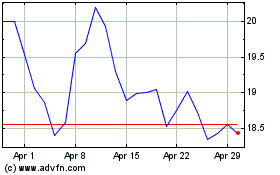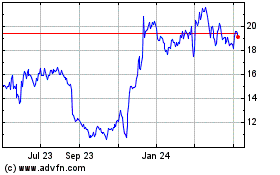Macy's CEO Lundgren to Step Down Next Year -- 3rd Update
June 23 2016 - 12:29PM
Dow Jones News
By Suzanne Kapner and Joann S. Lublin
Macy's Inc. longtime leader Terry Lundgren will step down as
chief executive at a time when the company he built over 14 years
is struggling to adapt to changing consumer demands.
The department store chain appointed one of Mr. Lundgren's top
lieutenants, President Jeff Gennette, to take over as CEO in 2017,
a move the company said was part of its succession plan. Mr.
Gennette, 55, joined the retailer in 1983 as an executive trainee
and has climbed the ranks over three decades, much like his
predecessor. Mr. Lundgren, who will turn 65 next year, will remain
chairman.
Macy's directors accelerated the timetable for Mr. Gennette's
ascent to give him the freedom to begin reshaping Macy's now,
according to a person familiar with the company. "He is going to
make the radical changes" before he officially takes the helm, this
person said, adding that Mr. Gennette "has a tough job" ahead of
him.
Shares of Macy's rose 4% to $34.12 in early trading. Even
factoring in that move, the company's stock has lost roughly half
of its value in the past 12 months. The decline attracted activist
investor Starboard Value LP, which last year pressured the company
to explore options for its vast real estate holdings.
"Now is the time to reset our business model to thrive in a
future that is being driven by rapid evolution in consumer
preferences and shopping habits," Mr. Lundgren said.
Macy's results have been disappointing. In the first quarter, it
reported its worst quarterly sales since the recession, setting off
fresh fears about the health of the U.S. retail sector and raising
concerns as to whether the chain is losing market share to online
players like Amazon.com Inc. and fast-fashion chains like
H&M.
Executives at the retailer, which Mr. Lundgren built into the
nation's largest department store chain, has complained that
consumer spending has shifted from handbags and cosmetics to
experiences and electronics, areas where it has little exposure. To
address the changes, Mr. Lundgren has pushed into off-price
retailing to try to compete with the likes of TJX Cos.' brands TJ
Maxx and Marshall's. Last year, it also acquired beauty and
skin-care chain Bluemercury Inc., in a bid to reach customers
beyond the mall.
Finding a lasting solution to the shifting shopping habits will
now fall on Mr. Gennette, a San Diego native and graduate of
Stanford University, who was anointed heir-apparent in March 2014
after being chief merchandising officer for five years.
Mr. Gennette is steeped in Macy's with a 33-year career where he
climbed every rung of the hierarchy. Starting as trainee, he also
served as a store manager for FAO Schwarz, held merchandise
positions for its men's and children's businesses, and eventually
took executive responsibility for various regions.
Some Macy's directors initially had been unsure whether the
CEO-to-be could identify the sweeping steps needed, given his long
Macy's tenure and similar background to Mr. Lundgren, the person
familiar with the matter said. But the full board ultimately
decided Mr. Gennette "has the courage" to make the big shifts
needed, this person said.
After elevating Mr. Gennette to president in 2014 putting him in
pole position to succeed Mr. Lundgren, Mr. Gennette has filled
holes in his management experience. He led analysts meetings, dealt
regularly with Macy's finance chief, attended board meetings and
learned more about marketing, this person said.
"There is no doubt that Macy's Inc. will need to be a
significantly different retailer in the future in the way we
operate and approach the marketplace," Mr. Gennette said on
Thursday. "But we also must continue to tackle our immediate
priorities with vigor and discipline."
The company said earlier this year it would close about 40
stores, cutting thousands of jobs. Macy's employed about 157,900
full-time and part-time workers as of Jan. 30. After deciding
against a spinoff of its properties, it has also hired advisers to
explore strategic options for its flagship stores and real estate
portfolio.
Mr. Lundgren, who started his career in 1975 at a Bullock's
store in Los Angeles, built Macy's from a regional department store
chain into a national fixture, clocking strong growth in many years
when rivals didn't, helped by the 2005 acquisition of rival May
Department Stores Co.
When he took the over helm, Macy's operated about 394 department
stores and 61 specialty stores and brought in $15.44 billion in
revenue. Today, Macy's operates about 870 stores under its namesake
brand as well as Bloomingdale's. In 2015, Macy's net sales stood at
$27.08 billion.
Austen Hufford contributed to this article
Write to Suzanne Kapner at Suzanne.Kapner@wsj.com and Joann S.
Lublin at joann.lublin@wsj.com
(END) Dow Jones Newswires
June 23, 2016 12:14 ET (16:14 GMT)
Copyright (c) 2016 Dow Jones & Company, Inc.
Macys (NYSE:M)
Historical Stock Chart
From Mar 2024 to Apr 2024

Macys (NYSE:M)
Historical Stock Chart
From Apr 2023 to Apr 2024
